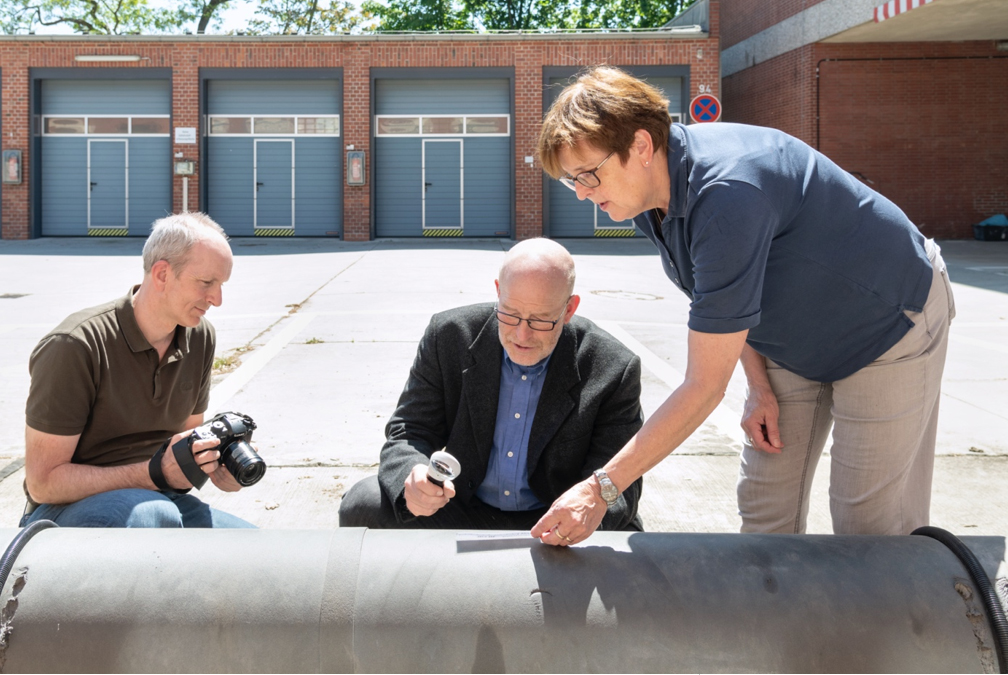
Failure detectives at work: Dirk Bettge, Christian Klinger, Astrid Zunkel (from left to right)
Source: BAM
Failure detectives: Uncover causes of failure and lern from them
Systematic failure analyses were already an important field of activity shortly after BAM was founded 150 years ago. Today, the often detective-like detailed work not only serves to uncover root causes, but above all to prevent economic damage as well as personal and environmental harm in the future.
If you ask Astrid Zunkel, Christian Klinger and Dirk Bettge about their profession, they answer that they are basically "detectives". Systematically, patiently and meticulously, they get to the bottom of damage to plants, components and materials in order to gain important insights that often play an important role in sustainable failure prevention. We met the three failure detectives to find out more about BAM's work in this field.
Why does BAM as a scientific-technical institution deal with failure analyses?
Christian Klinger: Failure analyses have always been part of our "bread and butter business" - in addition to numerous other services with which we at BAM ensure safety in technology and chemistry. After all, it is of great importance for the success of an industrial nation like Germany to bring new, forward-looking, and sustainable technologies safely to market maturity. Failure analyses play a very important role in this context: through the systematic, independent, unconditional and comprehensive clarification of failure cases, we gain valuable information e.g., about how certain materials behave in extreme situations, or when important components are at risk. With the knowledge gained, we can identify possible safety risks and hazards of new technologies, processes and materials and thus help to exclude them avoid them as best as possible.
Since when has BAM been involved in failure analyses and who are the clients today?
Astrid Zunkel: One of the first failure analyses in Germany was related to the detonation of gas cylinders filled with hydrogen on the Tempelhofer Feld in Berlin in 1894. Adolf Martens, pioneer of materials research and Head of the Royal Prussian Materials Testing Institute, one of BAM's predecessor institutions, was commissioned to investigate the cause of this accident. At that time, it became clear what dangers new technologies could bring. And that is why there was also increased investment in materials research and within this discipline in failure analyses.
Dirk Bettge: Failure analyses still play an important role for BAM 150 years after its foundation. Interestingly, also in the field of hydrogen, which plays a central role in the energy transition. To this end, BAM has founded the Centre of competence H2Safety@BAM in 2020, in which the immense hydrogen competence of BAM has been bundled and in which our failure analysts are also involved. Together with our project partners, we want to create confidence in hydrogen technologies and thus support the safe market ramp-up of green hydrogen. This would not be possible without findings from failures in laboratory tests on production plants, transport containers or hydrogen filling stations.
Christian Klinger: In addition to our own research projects, we also work in the field of failure analyses for courts, public prosecutors' offices, the criminal investigation department and insurance companies, for whom we clarify the technical causes of damages. Furthermore, we work very closely with various industrial companies, Federal ministries and authorities such as the Maritime Authority (Seeamt), the Federal Motor Transport Authority( Kraftfahrtbundesamt) and the Federal Network Agency (Bundesnetzagentur).
What failure analyses has BAM carried out in the last five years? Are there any prominent examples?
Christian Klinger: In the last five years alone, our experts have investigated around 110 cases of failures from a wide range of areas. These included an explosion in a refinery, ruptured bearings and gearboxes in wind turbines, failed heat exchangers in a power station and a defective oxygen supply system in a medical university. We are currently working on 15 cases. We are not allowed to give exact details, however, because most of the projects involve sensitive information and data that are subject to confidentiality. However, we are allowed to talk about some older cases today ...
What is BAM's special competence in the field of failure analysis? What approaches, methods and expertise can be found at BAM?
Dirk Bettge: BAM pursues an interdisciplinary approach in the field of failure analysis, which can only be achieved in this form by an institute with a broad range of topics such as BAM, which unites practically all relevant disciplines under one roof. The direct link between failure analysis and colleagues from all BAM departments is extremely important here. Only with this close and direct cooperation can complex cases of failures be tackled and solved, such as the particularly spectacular cases of the collapsed electricity pylons in Münsterland in 2005 or the broken ICE3 wheelset shaft in 2008. Mechanical engineers, materials engineers, chemists, civil engineers, welding engineers, non-destructive testing and biologists, among others, are involved in such cases. In addition, and not least, BAM's own workshops. They contribute their methods and reason about the cases together with us, which often results in surprising ideas and perspectives that help us move forward and, in the end, contribute to solving the cases.
Astrid Zunkel: It is also important that BAM, as a public institution, carries out systematic failure analyses strictly independently. In this way we ensure absolutely neutral clarification. We can be commissioned by several parties, or we can also provide arbitration as well as court expert opinions. This makes us the ideal partner, regardless of whether it is a matter of analysing failure or preventing damage.
Thank you very much for the interview!
Contact persons
Dr. Christian Klinger
Christian.Klinger[at]bam.de, +49 30 8104-1533, service loading fatigue, technical design, mechanical engineering
Dr. Dirk Bettge
Dirk.Bettge[at]bam.de, +49 30 8104-1512, fractography, visual macro- and microscopic examinations
Dr.-Ing. Tobias Mente
Tobias.Mente[at]bam.de, +49 30 8104-3730, welding technology, hydrogen-assisted cracking


